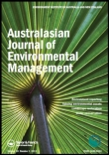
Australasian Journal of Environmental Management
Scope & Guideline
Shaping the future of environmental policy and practice.
Introduction
Aims and Scopes
- Environmental Impact Assessment and Policy Development:
The journal emphasizes the significance of environmental impact assessments (EIAs) and their role in shaping effective environmental policies, particularly in relation to sustainable development and biodiversity conservation. - Natural Resource Management:
Research published in this journal often addresses the management of natural resources, including land, water, and biodiversity, highlighting innovative strategies for sustainable use and conservation. - Community Engagement and Stakeholder Participation:
The journal underscores the importance of engaging communities and stakeholders in environmental management practices, focusing on participatory approaches that enhance decision-making processes. - Technological Innovations in Environmental Management:
A core area of focus is the role of technological advancements in addressing environmental issues, including renewable energy, waste management, and ecological restoration. - Climate Change Adaptation and Mitigation:
The journal consistently explores themes around climate change, including adaptation strategies and mitigation efforts, reflecting the urgency of addressing climate-related challenges. - Cultural and Indigenous Perspectives in Environmental Management:
There is a commitment to integrating cultural and Indigenous knowledge into environmental management practices, recognizing the value of traditional ecological knowledge.
Trending and Emerging
- Integration of Socio-Economic Factors in Environmental Management:
An increasing number of studies are examining how socio-economic factors influence environmental management practices, recognizing the interconnectedness of human behaviors and environmental outcomes. - Adaptive Management Practices:
There is a growing focus on adaptive management as a framework for dealing with uncertainty and change in environmental systems, emphasizing flexibility and responsiveness in management strategies. - Innovative Waste Management Solutions:
Recent publications are exploring innovative approaches to waste management, particularly in the context of circular economy principles and sustainable practices. - Impact of Climate Change on Biodiversity:
Research addressing the impacts of climate change on biodiversity and ecosystem services is gaining traction, reflecting the urgency of understanding and mitigating these effects. - Community-Led Environmental Initiatives:
There is an emerging trend of studies highlighting the effectiveness of community-led initiatives in environmental management, showcasing grassroots efforts to address local challenges. - Technological Applications for Environmental Monitoring:
The use of advanced technologies, such as remote sensing and data analytics, for environmental monitoring and management is becoming a prevalent theme, indicating a shift towards data-driven approaches.
Declining or Waning
- Traditional Conservation Methods:
Research focused solely on traditional conservation methods appears to be waning as the field evolves towards more integrated and innovative approaches that combine technology and community engagement. - Single-Disciplinary Studies:
There is a noticeable decline in papers that adopt a single-discipline perspective, indicating a shift towards more interdisciplinary research that incorporates multiple fields to address complex environmental issues. - Reactive Environmental Management Strategies:
The journal has seen fewer publications on reactive strategies for environmental management, suggesting a trend towards proactive and preventive measures in addressing environmental challenges. - Research on Localized Environmental Issues:
Publications focusing exclusively on localized issues without broader implications or connections to larger environmental themes seem to be decreasing, as the journal encourages studies with wider relevance.
Similar Journals
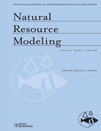
NATURAL RESOURCE MODELING
Pioneering insights for a sustainable future in natural resource modeling.NATURAL RESOURCE MODELING is a prestigious academic journal published by Wiley, focusing on the critical intersection of environmental science and modeling and simulation techniques. With an ISSN of 0890-8575 and an E-ISSN of 1939-7445, the journal has established itself as a vital resource for scholars and practitioners since its inception in 1990. Covering a wide array of topics related to the sustainable management and modeling of natural resources, the journal currently holds a reputable Q2 ranking in Environmental Science and a Q3 ranking in Modeling and Simulation, highlighting its impact within these fields, particularly with Scopus rankings placing it in the 60th and 57th percentiles, respectively. Although not an Open Access journal, it offers researchers, professionals, and students invaluable insights and methodologies pertinent to advancing the knowledge base in environmental management. The journal's commitment to high-quality research and its comprehensive scope reinforce its importance as a go-to publication for anyone interested in the sustainable future of our natural resources.
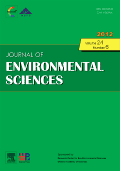
Journal of Environmental Sciences
Unveiling the Science Behind Environmental SustainabilityJournal of Environmental Sciences, published by SCIENCE PRESS, is a premier scholarly journal dedicated to advancing knowledge in the multidisciplinary fields of environmental science, environmental chemistry, and environmental engineering. Established in 1970 and based in Beijing, China, this journal has consistently garnered recognition for its high-quality research, demonstrated by its Q1 rankings across multiple categories, including Environmental Chemistry, Environmental Engineering, and General Environmental Science. With an impressive Scopus rank of #11 for Environmental Science, the journal has firmly positioned itself within the top tier of its field, attracting contributions from leading researchers and academics worldwide. Although it operates under subscription access, the journal's commitment to disseminating critical insights into pressing environmental issues makes it an invaluable resource for professionals, researchers, and students striving to make impactful contributions to the understanding and management of environmental challenges.

ENVIRONMENT DEVELOPMENT AND SUSTAINABILITY
Advancing Sustainable Solutions for a Changing WorldEnvironment, Development and Sustainability is a leading academic journal published by Springer, dedicated to advancing the understanding of the intricate relationships between environmental processes, human development, and sustainable practices. With an ISSN of 1387-585X and an E-ISSN of 1573-2975, this journal provides a platform for high-quality interdisciplinary research that integrates insights from economics, geography, and environmental policy. As of 2023, the journal boasts an impressive impact factor ranking, positioned in the Q2 category for Economics and Econometrics, Q1 for Geography, Planning and Development, and Q2 for Management, Monitoring, Policy and Law. This impressive stature has earned it a significant Scopus ranking, placing it within the top tiers of its field, particularly in Social Sciences and Environmental Science. With a publication timeline extending from 1999 to 2024, the journal serves as a valuable resource for researchers, professionals, and students alike, promoting knowledge exchange and fostering groundbreaking ideas essential for sustainable development. Although it operates under a subscription model, the impact of its articles is profound, making it a pivotal outlet for researchers striving towards sustainability in a rapidly changing world.

One Earth
Elevating Earth and Planetary Sciences to new heights.One Earth is a premier academic journal published by Cell Press, dedicated to advancing research in the fields of Earth and Planetary Sciences as well as Environmental Science. With an impactful presence in the academic community and an impressive ranking, One Earth has achieved Q1 status in both Earth and Planetary Sciences and Environmental Science, showing its commitment to the highest standards of scholarly excellence. Founded in 2019, this journal has quickly established itself as a leading platform for groundbreaking research, contributing to the global conversation on sustainability and environmental stewardship. With a distinguished Scopus rank placing it in the 99th percentile among Earth and Planetary Sciences and the 97th percentile in General Environmental Science categories, One Earth aims to disseminate cutting-edge findings and foster innovative approaches to address pressing global challenges. The journal is indexed with an ISSN of 2590-3330 and an E-ISSN of 2590-3322, supporting a broad audience of researchers, professionals, and students passionate about ecological integrity and planetary health.
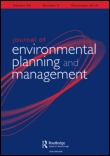
Journal of Environmental Planning and Management
Advancing sustainable solutions for a thriving planet.The Journal of Environmental Planning and Management, published by Routledge Journals, Taylor & Francis Ltd, is a leading academic journal dedicated to advancing the field of environmental science through innovative research and critical analysis. With a robust impact factor and categorized in Q1 across multiple disciplines, including Environmental Science, Geography, and Fluid Flow, this journal holds a prestigious position in the academic community. It serves as a vital platform for researchers, professionals, and students interested in the complexities of environmental management, policy, and planning, promoting insightful discourse on sustainable practices and innovative solutions. Although the journal does not currently offer Open Access options, it remains widely accessible through institutional subscriptions, ensuring that pertinent research reaches a broad audience. Since its inception in 1992, the journal has shown a commitment to excellence, making significant contributions to our understanding of environmental issues and the interplay between human activity and natural systems. The Journal of Environmental Planning and Management invites submissions that not only push the boundaries of existing knowledge but also foster interdisciplinary collaboration in the quest for sustainable development.
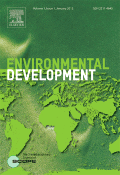
Environmental Development
Exploring the intersection of geography, planning, and environmental science.Environmental Development is a premier academic journal published by Elsevier, dedicated to advancing the field of environmental science through interdisciplinary research and innovative practices. With a focus on geography, planning, and development, as well as management, monitoring, policy, and law, this journal provides a rigorous platform for scholars and practitioners to share insights that shape sustainable environmental policy and practice. Holding a prestigious Q1 ranking in both relevant categories and boasting impressive Scopus rankings - 62 out of 821 in Geography and 60 out of 399 in Environmental Science - Environmental Development stands out as a critical resource for those invested in the future of our planet. The journal emphasizes impactful research that addresses contemporary challenges, fostering dialogue across disciplines and geographical boundaries. With a commitment to high-quality research, it offers an important outlet for those aiming to influence environmental policy and developmental strategies globally. Join the growing community of researchers, professionals, and students engaged in promoting sustainable environmental practices through the knowledge shared in this esteemed publication.
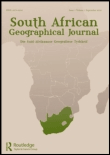
South African Geographical Journal
Advancing geographical insights for a sustainable future.The South African Geographical Journal, published by Routledge Journals, Taylor & Francis Ltd, is a leading scholarly platform dedicated to advancing research in the fields of geography, planning, and development. With an impressive history spanning from 1931 to 2024, this journal not only retains its relevance in the academic community but also proudly holds a Q2 rank in both Earth and Planetary Sciences and Geography, Planning and Development, marking it as a significant contributor to the scholarly discourse. The journal is ranked in the top 32% of its category within Scopus, affirming its stature among researchers and professionals. Although it currently does not offer Open Access, the journal provides a critical forum for the exchange of ideas, methodologies, and findings, encouraging dialogue that informs policy and practice in the geographical sciences. Readers can expect a rich variety of articles that encompass both theoretical and practical aspects of geography, making it essential for academics and practitioners alike.

ENVIRONMENTAL MANAGEMENT
Driving change through evidence-based environmental strategies.ENVIRONMENTAL MANAGEMENT, published by Springer, stands at the forefront of advancing sustainability and ecological stewardship in the fields of Ecology, Global and Planetary Change, and Pollution. With an impressive tracking history from 1977 to 2024 and prestigious quartile rankings reflecting its significant impact (Q1 in Ecology and Q2 in both Global and Planetary Change and Pollution), this journal engages a wide range of stakeholders, including researchers, policymakers, and environmental professionals. The journal is a vital resource for those dedicated to addressing pressing global environmental challenges, publishing rigorous interdisciplinary research that informs policy and practice. While it does not offer open access, its content remains accessible through institutional subscriptions. Located in the heart of New York, ENVIRONMENTAL MANAGEMENT is dedicated to fostering a substantive dialogue on innovative approaches to environmental preservation and management.

Observatorio Medioambiental
Empowering Scholars to Drive Environmental ChangeObservatorio Medioambiental is a premier journal dedicated to advancing the understanding of environmental science and policy, published by UNIV COMPLUTENSE MADRID, SERVICIO PUBLICACIONES. With a strong commitment to scholarly excellence, this journal serves as a vital platform for researchers, professionals, and students interested in addressing contemporary environmental challenges through interdisciplinary studies. Although currently not listed as an Open Access journal, it maintains high academic standards, ensuring that published research contributes significantly to the field. The journal fosters the dissemination of knowledge regarding ecological conservation, sustainable development, and environmental management practices. By providing a rigorous peer-reviewed environment, Observatorio Medioambiental plays a crucial role in shaping informed and sustainable environmental policies and practices on both local and global scales.

International Journal of Environmental Science and Technology
Pioneering research at the intersection of science and technology.International Journal of Environmental Science and Technology, published by SPRINGER, stands as a premier platform for the dissemination of cutting-edge research in the fields of environmental science, technology, and engineering. With an impressive scope spanning from 2005 to 2024, this journal serves as a vital resource for academic and professional communities engaged in tackling pressing environmental challenges. It boasts a strong reputation, evidenced by its Q1 ranking in Agricultural and Biological Sciences and solid placements in Environmental Chemistry and Engineering. Researchers searching for high-impact studies will find the journal's contributions significant, as reflected in its rankings within Scopus: 34th percentile in Agricultural and Biological Sciences and notable standings in Environmental Engineering and Chemistry. Although the journal is not currently an Open Access resource, it maintains a commitment to academic rigor and innovation, making it indispensable for those devoted to advancing knowledge in environmental sustainability and technology.